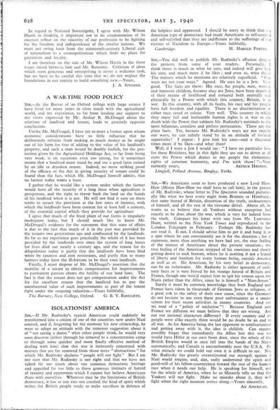A WAR-TIME FOOD POLICY
Snt,—As the Bursar of an Oxford college with large estates I have lived for many years in close touch with the agricultural world, and my experience, so far from lending any support to the views expressed by Mr. Arthur R. McDougal about the relations of landlord and tenant, leads to precisely opposite conclusions.
Unlike Mr. McDougal, I have yet to meet a farmer upon whom economic considerations have so little influence that he deliberately refrains from making as much money as he might out of his farm for fear of adding to the value of his landlord's property, and such a man would be doubly foolish, for the pro- tection given by the Agricultural Holdings Act, so far from being very weak, is on occasions even too strong, for it sometimes means that a landlord must stand by and see a good farm ruined by an idle or drunken tenant. Indeed, no more striking proof of the efficacy of the Act in giving security of tenure could be found than the fact, which Mr. McDougal himself admits, that no farmer today wants a lease.
I gather that he would like a system under which the farmer would have all the security of a long lease when agriculture is prosperous, and the right to throw back the land on the hands of his landlord when it is not. He will not find it easy on these terms to secure the provision at the low rates of interest, with which the landlords have been content for at least half a century, of the essential capital which they provide for agriculture I agree that much of the fixed plant of our farms is singularly inadequate today, but I should much like to know Mr. McDougal's evidence for the statement that this state of affairs is due to the fact that much of it in the past was provided by the tenants two generations ago and confiscated by the landlords. So far as my experience goes practically the whole of it has been provided by the landlords ever since the system of long leases for lives died out nearly a century ago, and the reason for its dilapidation today is partly that the landlords have been bled white by taxation and rent remissions, and partly that so many farmers today have the ill-fortune to be their own landlords.
Finally, I must dispose of Mr. McDougal's assertion that the inability of a tenant to obtain compensation for improvements to permanent pasture shows the futility of our land laws. The fact is that the tenant does not get compensation under the Act for the excellent reason that the landlord has to pay the unexhausted value of such improvements as part of the tenant right under the outgoing valuation.—Yours faithfully,
The Bursary, New College, Oxford. G. R. Y. RADCLIFFE.


































 Previous page
Previous page